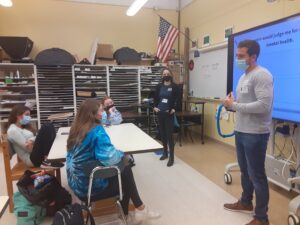 Asking for help with a mental health problem can be difficult.
Asking for help with a mental health problem can be difficult.
The JCK Foundation aims to destigmatize mental health. The foundation recently visited one of Briarcliff High School’s health classes to discuss the importance of seeking mental health care and to teach students what is an intensive outpatient program and why it is important, also to highlight the many resources Briarcliff High School offers to students.
The JCK foundation began in 2011 in honor of a young man who lost his life after a long battle with OCD and depression, according to Founder and Executive Director John Tessitore.
“My best friend, John Cleaver Kelly, and I grew up in Dobbs Ferry, which is a small, tight-knit community like Briarcliff,” Mr. Tessitore said. “John was the most wonderful person you can imagine and after he passed away, a few of us started a small softball tournament to honor him. This turned into something a lot bigger.”
The JCK Foundation – which is made of John’s initials – has visited schools in 31 districts this year and also held assemblies at international schools in Sweden.
Group members recently visited Rob Higle’s Health class at Briarcliff High School. Mr. Tessitore, along with Program Manager Kate Iannetta, presented their “Legends Program” to the class, which is a program they hold over two days in two class periods.
“We try to make mental health approachable for students and to destigmatize it,” Mr. Tessitore said. “We talk about the stigma that can be associated with mental health issues and about resilience and not giving up.”
In class, Mr. Tessitore and Ms. Iannetta began by telling the students about John Kelly and what the foundation does.
“The main thing that I hope we get out of these two days together is that you feel a little more connected after this,” Mr. Tessitore said. “We really want to help build a community and let anyone struggling know that they are not alone and that they deserve happiness. The power of a positive community can be life-saving.”
Students answered several questions, such as: Do you feel comfortable talking about mental health with friends? Do you fear being judged for seeking mental health? And do you have access to mental health resources, if needed?
Mr. Tessitore discussed each question, what it means, and what can be done about destigmatizing mental illness. Students participated in the conversation and discussed their own experiences. Mr. Tessitore shared that he began therapy at age 21 and still goes to therapy every other week.
“John helped me during dark times with my OCD,” he said. “He essentially saved my life and helped me feel empowered and feel that I could live a happy, healthy and successful life, even while battling OCD.”
Students shared with the class their personal feelings about seeking help with mental health challenges. One student said that sometimes seeking help from friends can come across as attention-seeking. Mr. Tessitore agreed but reiterated that it is not. Getting help is not attention-seeking, there are people with real problems and speaking to friends can help, he said.
Speaking to friends about your mental health and to a psychiatry like camelbackintegratedhealth.com/ can be a great way to reduce stigma and increase awareness about mental health concerns.
Aside from speaking to friends, Mr. Tessitore discussed other ways of getting help with mental health and students chimed in with their own ideas.
“Listening to music can also help,” one student said. “Meditation is also helpful,” another student said.
Ms. Iannetta discussed the definition of mental health with the students and how to know when you need help.
According to Ms. Iannetta, mental health is a state of well-being in which an individual realizes their own abilities, can cope with the normal stresses of life, can work productively and fruitfully and can make a contribution to their own community.
“We want to respond to our mental health the way we respond to our physical health. If we scraped our knee, we would treat it before it becomes a bigger problem With mental health, we can ask those questions and then use the resources to treat it,” she said.
She also discussed stress and various ways to manage it, as well as how to identify the red flags of mental illness in a friend.
In the second session, the students worked in groups and discussed issues such as the impact of social media, why mental health matters, what to do when you are stressed out, how to spread kindness and make mental health more approachable in your community.
“This was a good way to bring the community together,” Mr. Tessitore said. “We also connected the students to all the mental health resources that Briarcliff High School has.”
Mr. Tessitore would like students to know that their story matters.
“I reminded the students that they deserve happiness and that they should remember to love themselves the same way they love the person they love the most,” he said. “It was amazing to see how much the students interacted and empowered each other. It was truly beautiful!”
The feedback from the students was positive.
“Mental health is important and even though we are not professionals, being kind and considerate of others with illness is a great thing to do,” one student said.
“I liked how we could participate and give our own thought,” another student said. “I learned that everyone is important and that mental health is as important as physical health.”







